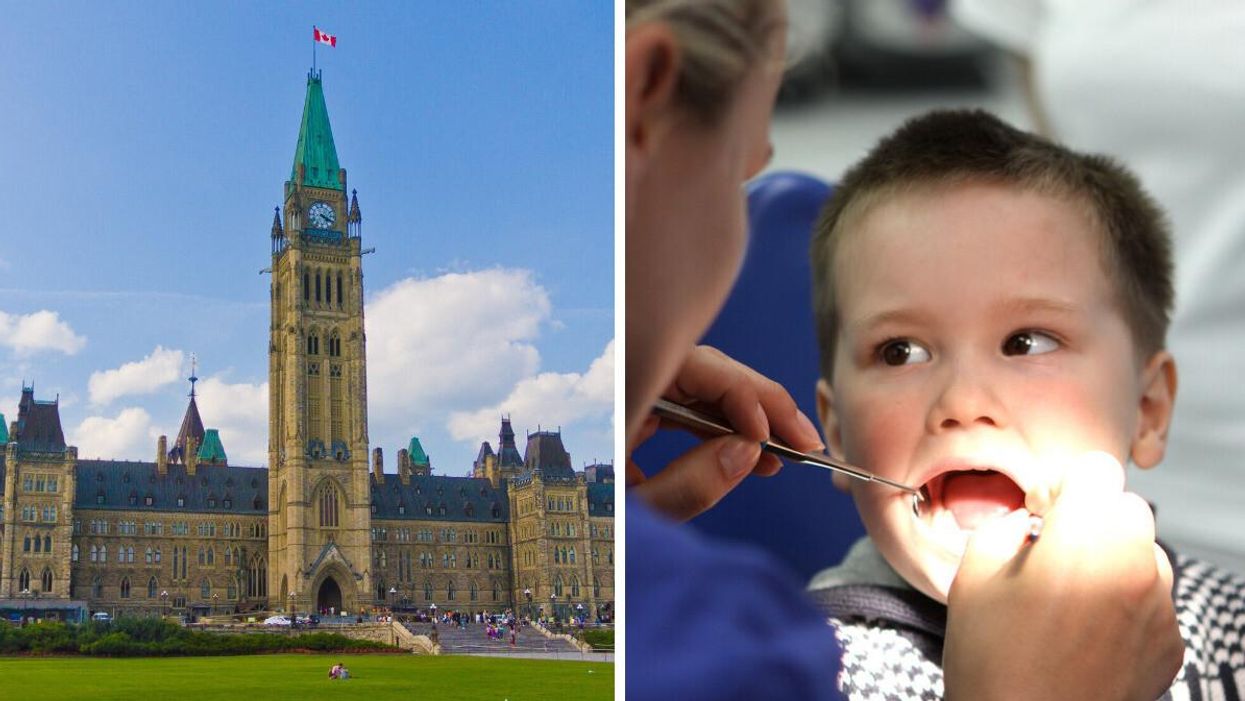Canada's Dental Care Program Has Officially Become A Law & This Is What You Can Expect
Everything you need to know. 🦷

Canada's Parliament building. Right: A child at the dentist.
As of November 18, Canada's Dental Care program has officially been signed into law.
This means that some Canadians are already eligible for payments that will cover dental expenses, with more qualifying for the program over the next few years.
The program is a product of an agreement between Prime Minister Justin Trudeau and NDP Leader Jagmeet Singh, which stipulates the NDP provide the Liberal minority government support in return for passing key NDP platform goals.
This Dental Care program was one of the biggest goals of the NDP.
\u201cTonight our Dental Care Plan became law!\n\nA major blow to Conservatives and their attempts to privatize Canadian Healthcare.\n\nDespite every effort by Pierre Poilievre to stop us - he failed and Canadians won.\u201d— Jagmeet Singh (@Jagmeet Singh) 1668730810
So, here's how it's going to work, according to an announcement made by the Canadian government.
Does Canada provide free dental care?
Canada's new dental care benefit will be its first form of national dental care coverage.
To begin with, the benefit is specifically trying to provide dental care for uninsured Canadians from low-income households, starting with children under the age of 12.
It will help by providing those eligible with direct, tax-free payments that cover dental expenses up to a certain amount.
Over the next two years, that program is going to expand to include more Canadians, of all ages, who make an income under the determined threshold.
Who qualifies for the Canada Dental Benefit?
When the new program officially launches, the first phase of coverage will be for children under the age of 12 in families who make less than $90,000 a year and are not covered by private insurers.
This coverage starts at $650 a year per child for households making less than $70,000 and is adjustable according to income threshold.
It is $390 a year, per eligible child, for those who make between $70,000 and 79,999 and $260 for families who make between $80,000 and $89,999 a year, per eligible child.
And this qualification is going to expand further in he future.
The Liberals previously stated they plan to expand dental care coverage to those who are under the age of 18, persons with disabilities and seniors by 2025 or sooner.
The feds have also said they're committed to implementing a dental care program for all households who make less than $90,000 by 2025.
When will Canada's Dental Benefit start?
The targeted start date for the new dental program is December 1, 2022.
While that's the expected start time, eligible families can expect coverage retroactively for any qualifying dental care that took place from October 1, 2022.
How do I apply for the Canada Dental Benefit?
Qualifying families can go to the Canada Revenue Agency (CRA) to apply for coverage.
To do so, those registering need to attest that their child isn't receiving any private dental care coverage and they have out-of-pocket expenses that need covering.
They may need to show proof of these expenses if asked.
From there, Health Canada and the CRA will dole out the money "in a timely fashion."
This benefit will also not affect any other benefits you or your family are getting.
With this new program, some Canadians can expect to pay a little less in the way of dental care.
And if you're looking for other ways to maybe save up some cash, why not look into setting up an RRSP, if you haven't already?
While it might sound confusing, Narcity spoke to an expert to break down what an RRSP does, and how it can help young people.
This article's cover image was used for illustrative purposes only.